E-Newsletter
Talent attraction and retention a key theme at Northern Virginia Chamber conference; Fairfax County EDA hosts Israeli defense and technology delegation
While key economic indicators for Northern Virginia, such as a low unemployment rate and solid job growth, are strong, competition is intense to attract and retain workers to fill the projected future surge of tech jobs.
Concern about attracting, retaining and growing talent for jobs in Northern Virginia was a leading theme emphasized at the Northern Virginia Chamber of Commerce’s 28th annual “Regional Economic Outlook 2020” conference January 30 at the Hilton McLean Tysons Corner.
The conference featured Anne Kress, the new president of Northern Virginia Community College (NVCC), and Terry Clower, director of the Center for Regional Analysis at George Mason University. Four Northern Virginia-based business, non-profit and media leaders participated in a panel discussion: Calaneet Balas, CEO and president, The ALS Association; Len Forkas, president, Milestone Communications; James Quigley, CEO/co-founder, GoCanvas; and Scott Thuman, chief political correspondent, Sinclair Broadcast Group. Mary-Claire Burick, president, Rosslyn Business Improvement District, served as the moderator.
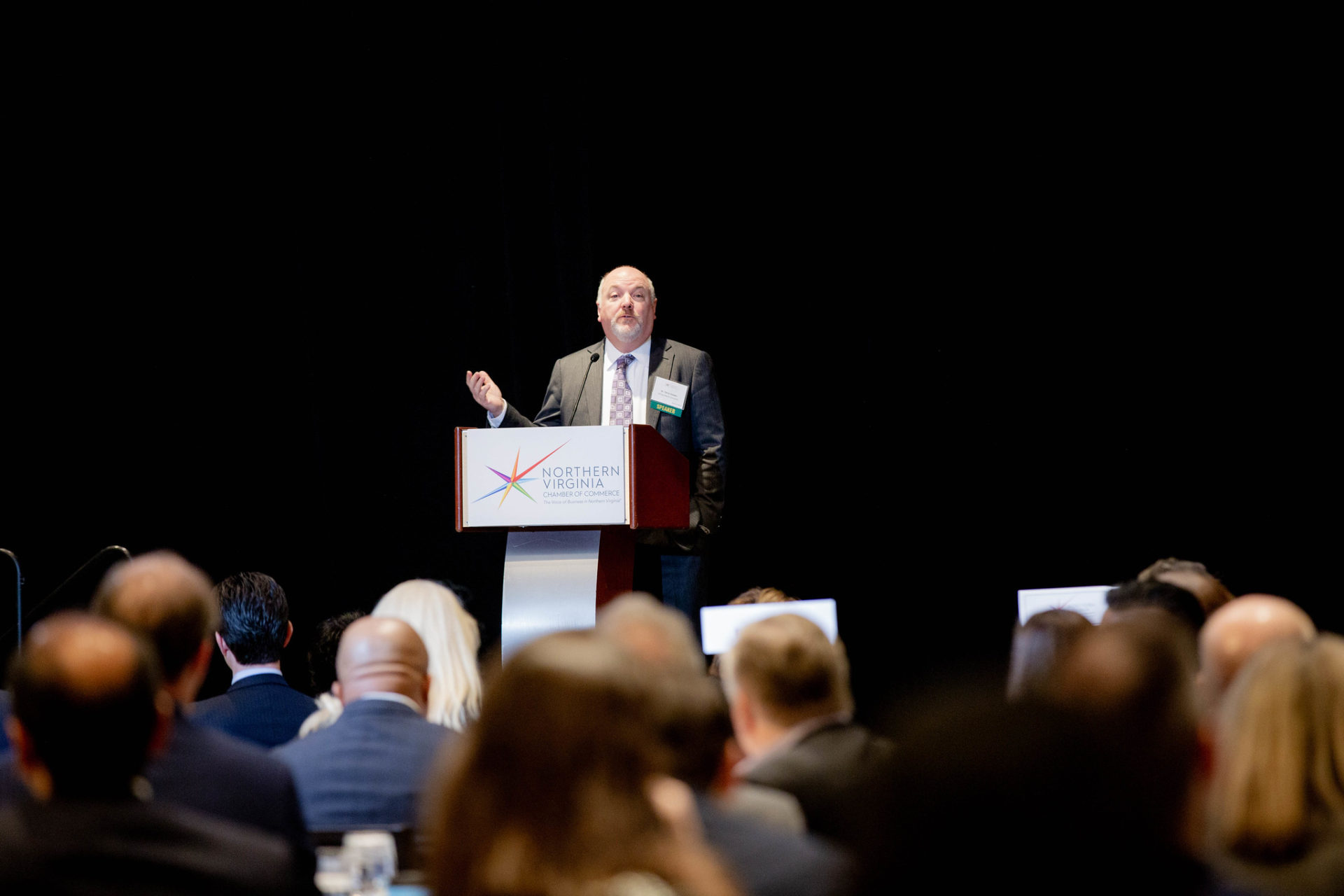
Terry Clower, director, Center for Regional Analysis, George Mason University. (Photo courtesy Northern Virginia Chamber of Commerce)
Focusing on the state of the economy, Clower discussed key economic indicators and his predictions for the nation’s and Northern Virginia region’s 2020 economy.
“Northern Virginia in terms of economic growth in this region is ‘kicking butt,’” Clower joked. “Forty-five percent of all job growth in the region is in Northern Virginia. “The unemployment rate in Northern Virginia, the last time I checked, is at 2.1 percent.”
Clower predicted that “the competition for workers to fill jobs is going to intensify.”
“We will see continued job growth, but that jobs growth is going to be constrained somewhat by the availability of labor,” Clower said.
“Absolutely nobody in the world is better (than the U.S.) at creating new technologies, disseminating that technology and adopting that technology in our business practices,” he said. “The challenge is that most of that technology usually winds up being disruptive to the labor market. Maybe we need to learn new skills or just a way of displacing labor with AI or some other technologies.”
The good news is that the jurisdictions are cooperating with each other for economic development, according to Clower, noting the formation of the Northern Virginia Economic Development Alliance (NOVA EDA) last year.
In past years, intra-regional competition has been “fierce here,” according to Clower, “I would argue to you that while we’ve had great success, we could have had more than we have we’re now getting our heads around that and we’re starting to do better.”
“Talent is based on labor sheds, not on the jurisdictional boundaries,” said Clower, and so now the jurisdictions are cooperating for a “new era” in regional economic development practice.
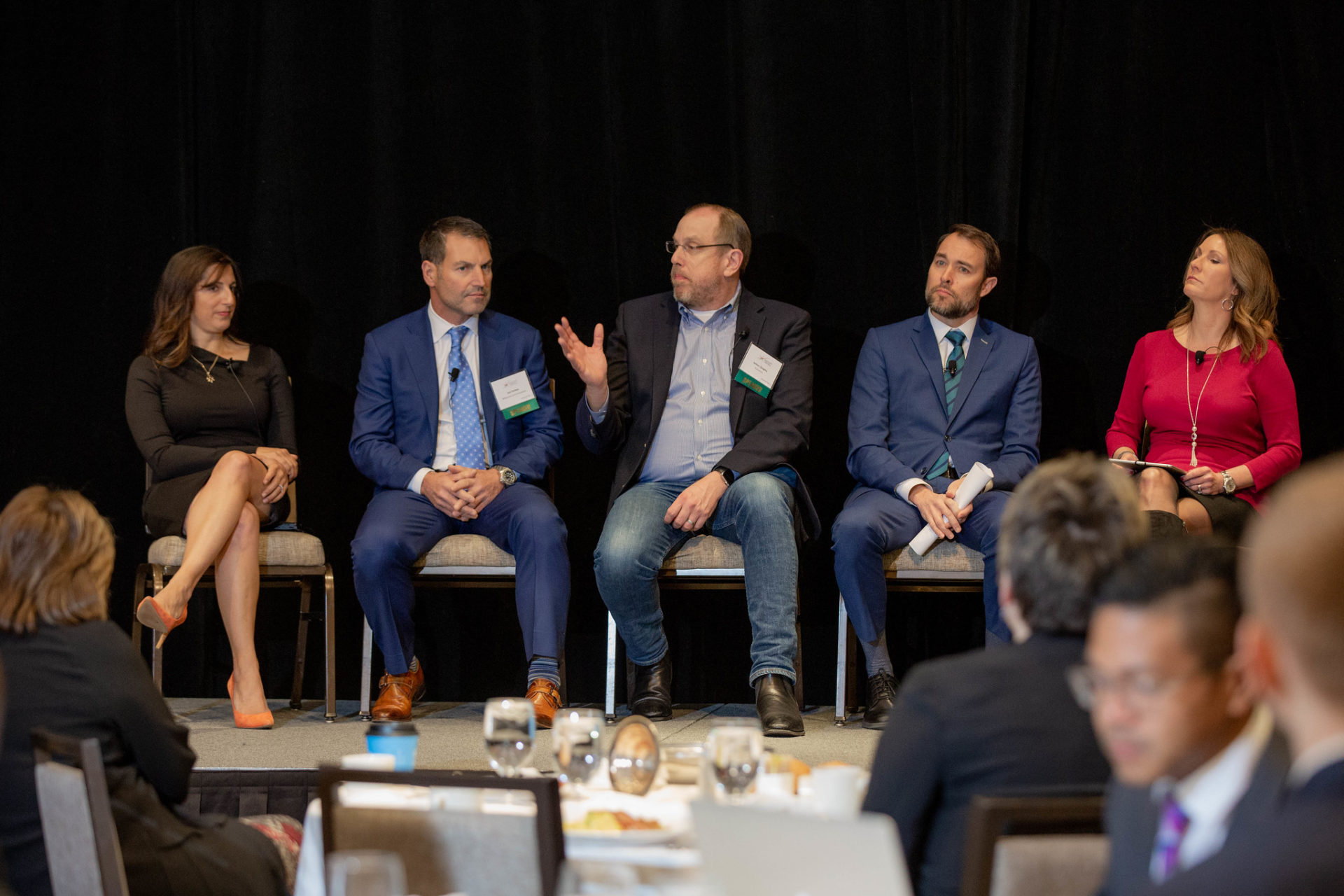
A business panel discusses talent attraction and retention. Left to right: Calaneet Balas, CEO and president, The ALS Association; Len Forkas, president, Milestone Communications; James Quigley, CEO/co-founder, GoCanvas; Scott Thuman, chief political correspondent, Sinclair Broadcast Group; Mary-Claire Burick, president, Rosslyn Business Improvement District. (Photo courtesy Northern Virginia Chamber of Commerce)
Quigley, who is vice chairman of the FCEDA Commission, said: “I’ll put on my economic development hat. I’m incredibly proud of what’s happened just the last year regionally,” referring to the formation of the NOVA EDA.
Victor Hoskins, Fairfax County Economic Development’s president and CEO, led the collaboration with nine other Northern Virginia jurisdictions to form the NOVA EDA, which was launched last September to market Northern Virginia jointly outside the region. Ten community entities signed a memorandum of understanding (MOU) that commits them to working together on regional brand creation and promotion activities and to engage more fully with the NOVA EDA as a regional economic development organization.
The NOVA EDA consists of the FCEDA and the Alexandria Economic Development Partnership, Arlington County, City of Fairfax, City of Falls Church, Fauquier County, Loudoun County, City of Manassas, City of Manassas Park, and the Prince William County Department of Economic Development.
Emphasizing the importance of the NOVA EDA, Quigley also discussed the need to invest in educational training and building innovation campuses for the tech job future.
We need to “retain, retrain, grow and attract’ talent to continue to build the regional economy, Quigley said.
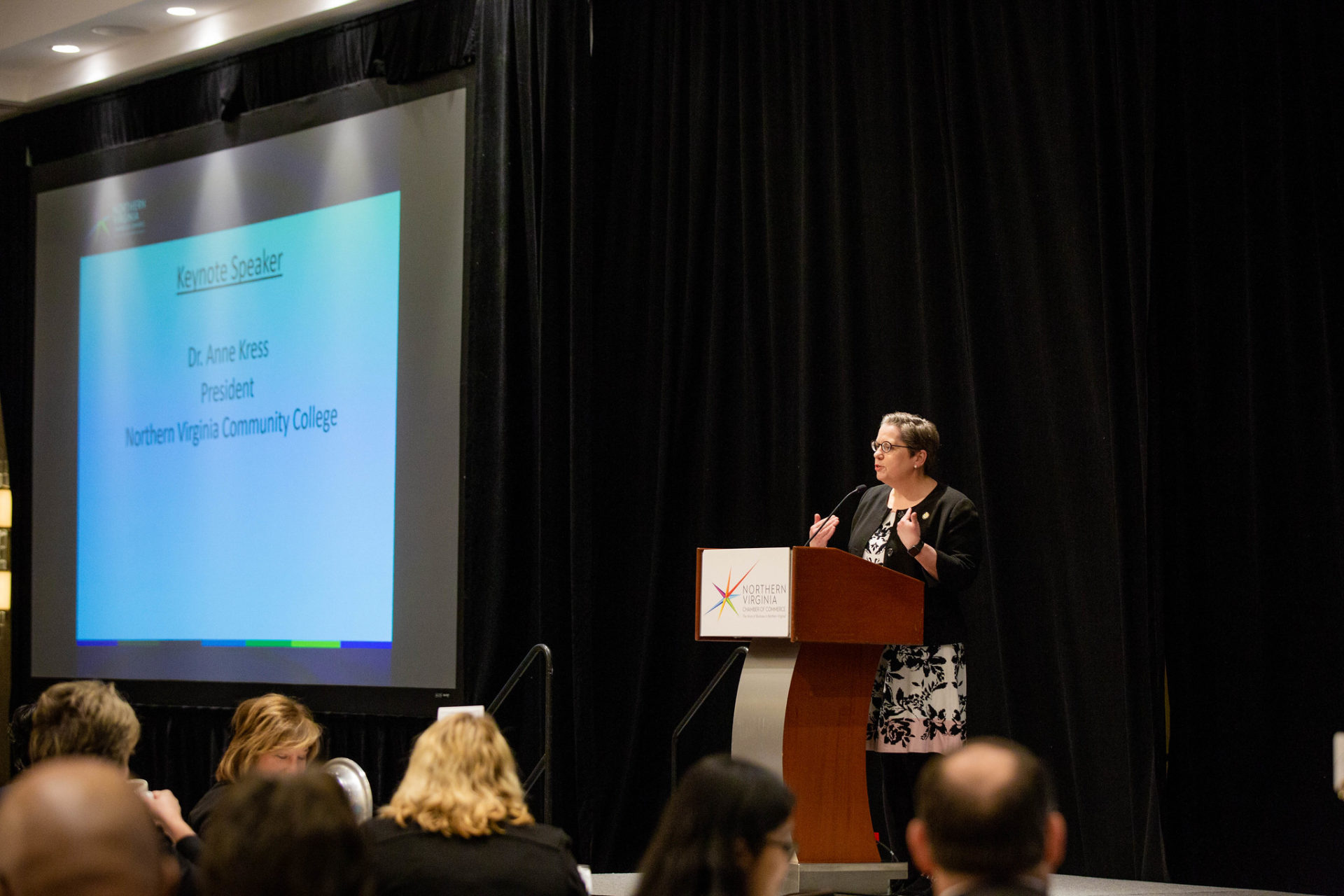
Anne Kress, president, Northern Virginia Community College (photo courtesy of Northern Virginia Chamber of Commerce)
Also focusing on talent, NVCC President Kress, who assumed her post last month, focused on the importance of creating partnerships between higher education institutions and businesses.
“Partnerships matter,” Kress said. “We want to help companies find the talent that they need.”
“We are our region’s talent pipeline,” she added. “We want to partner with you on the future of work and the future of Northern Virginia.”
Fairfax County EDA hosts Israeli defense and technology delegation
With the focus on fostering potential technology collaboration opportunities between Israeli defense manufacturing companies and U.S. companies, the Fairfax County Economic Development Authority (FCEDA) and the Virginia Israel Advisory Board (VIAB) presented the “Israel-Virginia Technology Innovation and Collaboration” conference at FCEDA headquarters on Monday.
With nearly 100 people in attendance, the conference focused on the latest trends in the U.S. and in Israel in defense, aerospace, homeland security, border and infrastructure protection, and marine and land tactical surveillance. In addition, one-on-one business-to-business meetings were held for the Israeli companies to pitch their technological innovations to establish potential business opportunities with the U.S. companies. The Israeli companies are seeking to establish partnerships with U.S. companies to gain contacts with DOD, DHS, and other federal agencies.
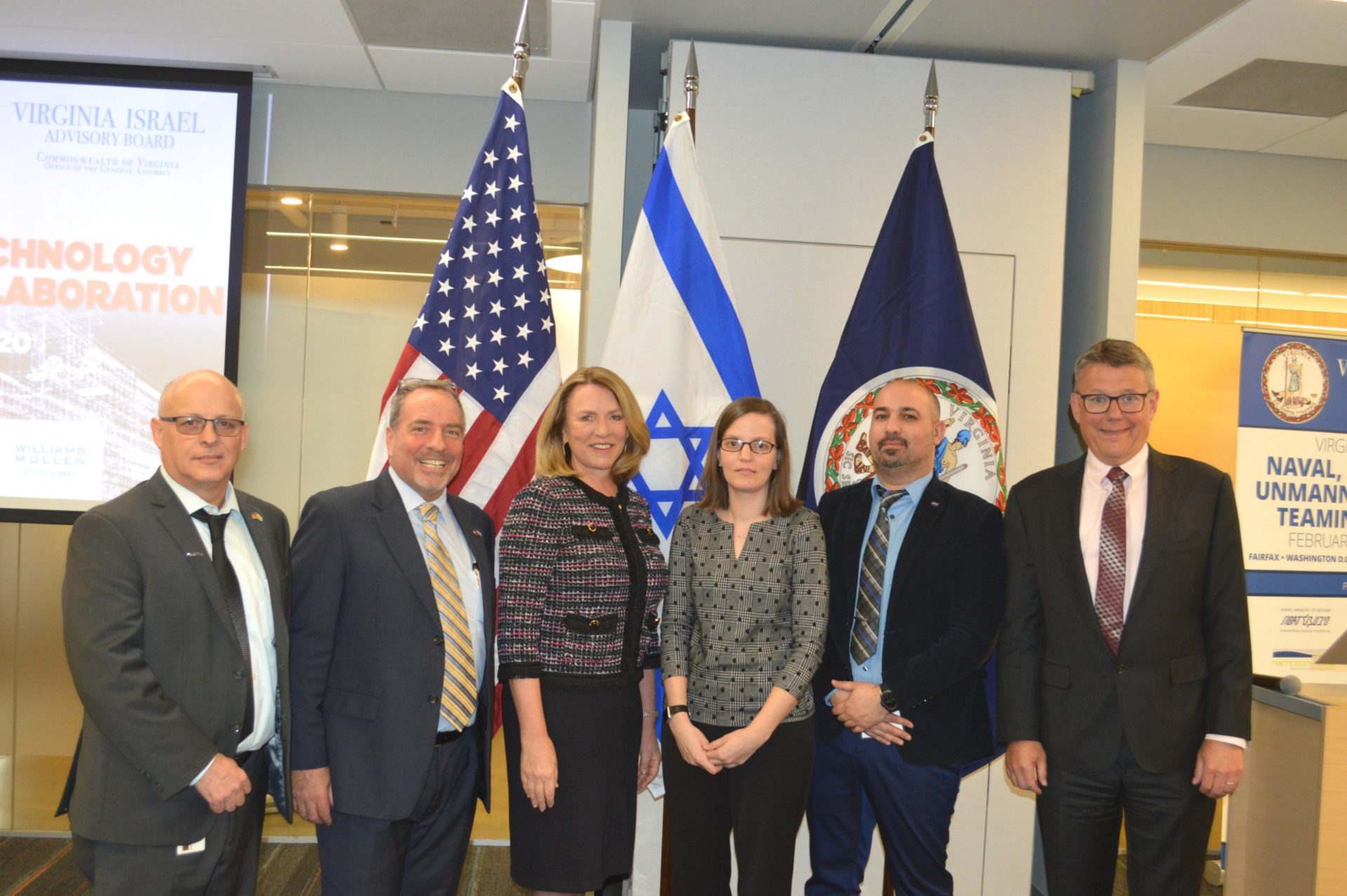
left to right: Asher Kotz, business investment manager, Cybersecurity and Israel, FCEDA; Dov Hoch, executive director, Virginia Israel Advisory Board; Deborah Lee James, former Secretary of the U.S. Air Force; Megan Mahle, director of industry partnerships, Security Science and Technology Directorate, U.S. Department of Homeland Security; Eliad Peretz, NASA; Jan Mul, director of international business investment, FCEDA. (Photo, FCEDA)
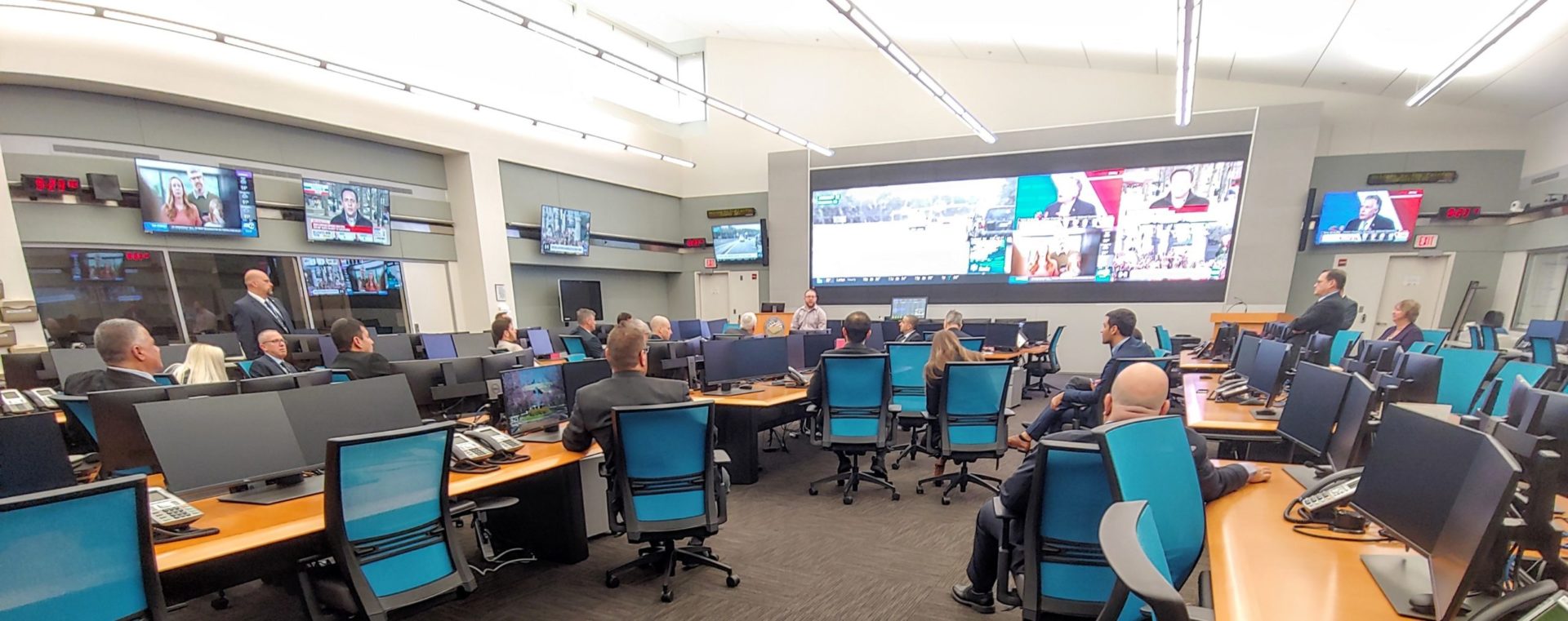
The Israeli delegation at the Fairfax County McConnell Public Safety and Transportation Operations Center. (Photo, FCEDA)
The group also visited the Fairfax County McConnell Public Safety and Transportation Operations Center to attend a briefing on the technologies employed at the facility. Members of the delegation presented on their companies’ innovative technology solutions for law enforcement, public safety and emergency responder management. Click here to read more about the event.
At the invitation of Virginia Gov. Ralph Northam, the International Defense Cooperation Directorate of the Israel Ministry of Defense (SIBAT) brought the delegation of 17 Israeli companies to visit Virginia to explore collaboration and investments in the local economy.
Since 2005 the FCEDA has had an office in Tel Aviv to work with Israeli companies interested in locating to or expanding in the U.S. More than 30 Israeli companies have a presence in Fairfax County. International companies choose Fairfax County for a U.S. location because of the large technology cluster, private- and public-sector customers, a diverse and cosmopolitan community, and a location between Washington, D.C., and Washington Dulles International Airport.
News Travels Fast
Stay ahead of the curve with the latest business news from Northern Virginia. Receive updates on moves, incentives, workforce, events and more.